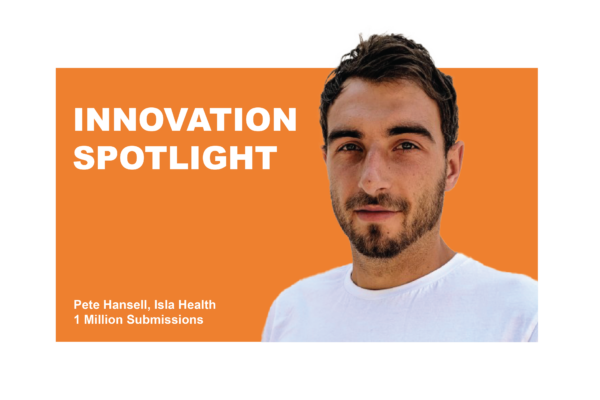Isla Health reaches one million submissions: a milestone in supercharging healthcare

One million submissions! That’s a phenomenal achievement for Isla. How does this milestone make you feel about the impact the platform is having on healthcare?
Seeing users actively engage with our platform is incredibly rewarding and ultimately is a good proxy metric for the value that we are adding to clinicians and patients each day. This milestone for us is just a vote of confidence from our users that the way we are thinking about how healthcare needs to be delivered in the future is striking a chord. We see new record activity each week which is really exciting.
Our goal is to revolutionise healthcare delivery. We believe that understanding a patient’s condition should be a continuous and asynchronous process. This approach lets clinicians monitor patients outside the hospital and step in proactively when needed. I think that our approach of building broadly applicable technology which now supports nearly 40 specialties has been key to the adoption of Isla across the NHS. Every submission brings us one step closer to a more scalable and efficient healthcare system.
What do you think contributed to achieving this milestone?
Firstly, our clinical partners and patients. Their willingness to use Isla has been key. Their feedback constantly pushes us to improve and innovate, leading to better health outcomes.
And secondly, the Isla team. I’m incredibly proud of our team. Our culture is all about collaboration and striving for excellence. We keep a fast pace but make sure to enjoy the journey, even during tough times. The hard work and dedication of each team member have been crucial to this achievement.
Moving beyond this milestone, let’s talk about the prestigious HSJ awards. Isla received a high commendation for ‘Improving Out-of-Hospital Care Through Digital’. Can you tell us more about this project?
We’re proud to have been recognised for our collaboration with the Royal Cornwall Hospital NHS Trust (RCHT) in implementing teledermatology for suspected cancer patients. This initiative is streamlining skin cancer diagnosis in Cornwall’s rural communities. Patients used to wait weeks for specialist appointments, often missing the NHS’s two-week referral (TWW) target for suspected cancer cases.
The team at Royal Cornwall introduced “Community Lesion Imaging Clinics” (CLICs) to provide essential services closer to patients, cutting down travel and wait times. CLICs use Isla for teledermatology, enabling consultants to review cases quickly, typically within a day. The success of this programme has led to plans for expansion and the exploration of AI for even faster diagnoses. You can read more about this project on our blog.
Can you share some other user stories that show the value Isla brings?
Absolutely! Chronic wound management is one example, because caring for 3.8 million patients with chronic wounds annually is an enormous challenge for the NHS. This leads to millions of community nurse visits each year. At Nottinghamshire Healthcare NHS Foundation Trust, wound care teams use Isla for remote-first triage and monitoring. Patients and care homes submit wound images for review, allowing the clinical team to prioritise site visits. This has resulted in 15% of patients being managed virtually, 75% being shifted towards planned interventions, and significant savings in clinical time and CO2 emissions.
We’re also making a significant impact in perioperative waitlist management. The NHS is in a waiting list crisis, with millions of patients on some waiting for over a year. In Trauma and Orthopaedics alone, there is a backlog of circa 800,000 patients. Isla is stepping in to help streamline these waitlists. For example, at Chelsea and Westminster NHS Trust, our sophisticated digital pathway achieved an 86% response rate within six days. This enabled 17,000 patients to inform the trust that they can be removed from the waiting list during the first 9 months of rollout, a shift to 37% of patients avoiding a face to face pre-operative appointment and an 8% increase in operating theatre utilisation. Isla is used right across the peri-operative pathway. Patients now begin to build up the picture of their condition whilst on the waiting list, which dramatically improves triage and makes appointments much more valuable. After surgery, clinical teams run ‘active surveillance’ to detect infections early using patient submitted images, videos and questionnaires. Across the country, this is avoiding surgical site infections, which are very dangerous and very costly.
With 1 million submissions under your belt, what future goals or opportunities are you most excited about?
We’re most excited about the following three areas:
Supported self-care: Community care is struggling, largely because of our ageing population. The demand for community services is outpacing the system’s capacity, and hiring more staff isn’t feasible due to financial constraints. The solution lies in supported self-care. Although this concept hasn’t been successfully implemented at scale within the NHS, we believe digital tools can make it possible by supporting patients, families, and clinicians.
AI: Isla supports many surgical site infection (SSI) teams, which have seen significant reductions in readmissions and bed days. We’re expanding this impact through AI. Our computer vision models assess images, identify signs of infection, and flag patients needing attention. An independent review showed that images are flagged with human level accuracy. We are midway through a really exciting feasibility study with multiple NHS partners.
Risk stratification: We’re good at collecting patient information and data from various sources. Our product roadmap focuses on risk stratification, analysing data to assess patient risk, and presenting this information clearly to clinicians. This will help prioritise patients and make effective decisions.
Huge thanks to Pete for taking the time to speak with us and congratulations again on reaching the 1 million submissions milestone! We can’t wait to see what you achieve next in transforming healthcare and building a brighter future for us all. To find out more about Isla and stay on top of their latest news, check out their website.
